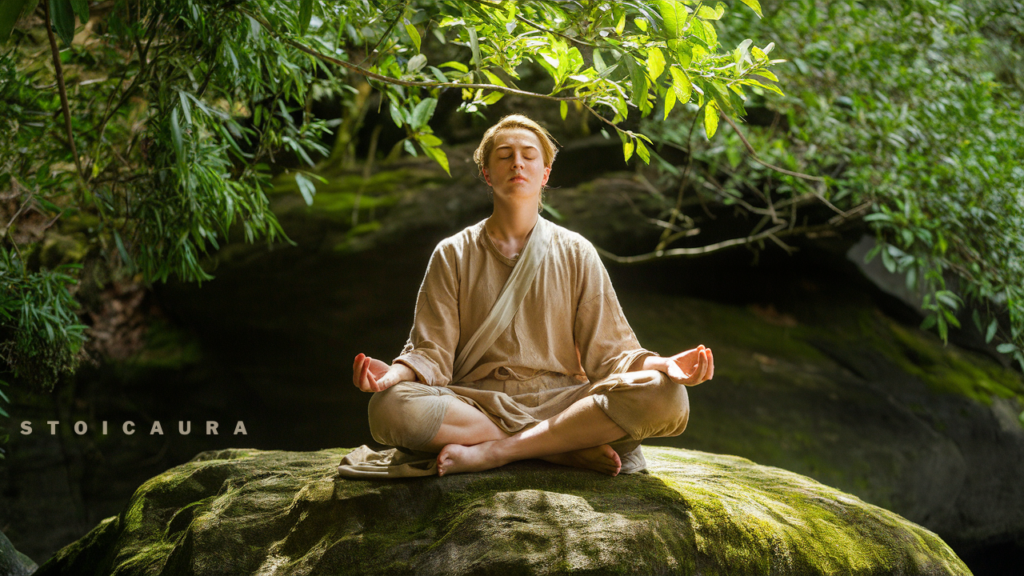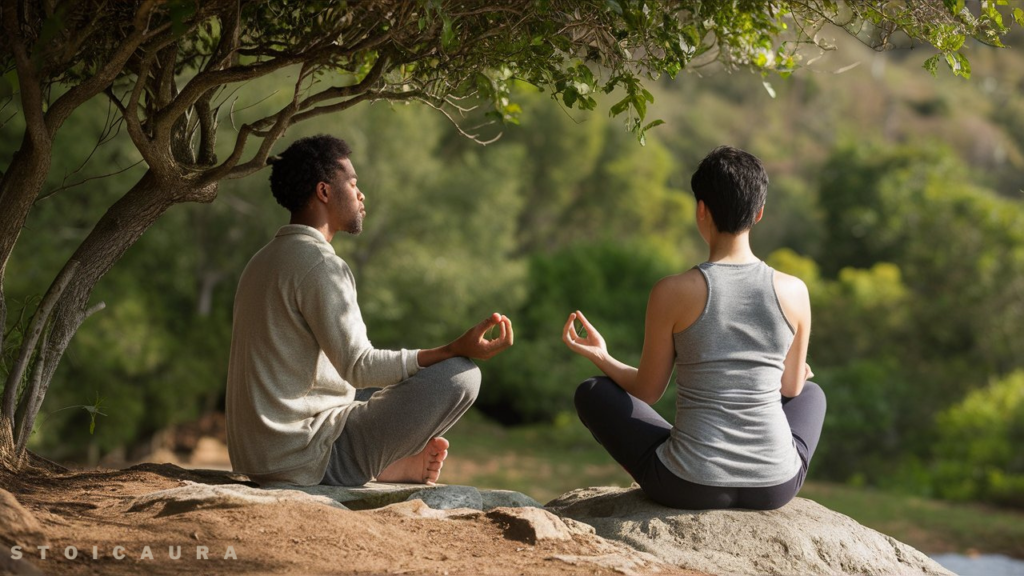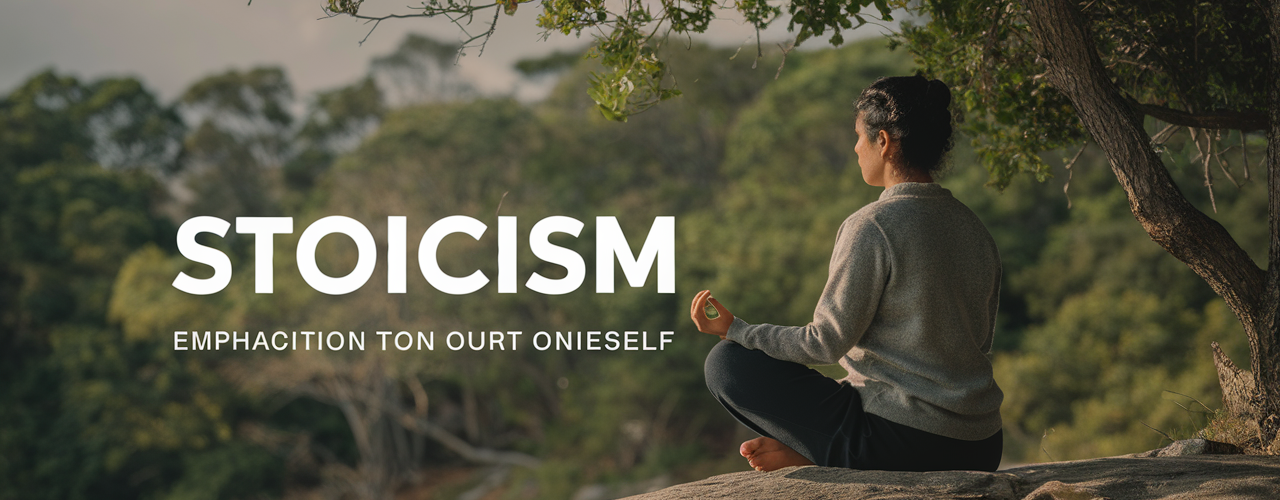
Introduction
Have you ever found yourself caught in the relentless pursuit of happiness, only to feel more entangled in life’s complexities? What if the key to true joy lies not in adding more to our lives, but in embracing less? Enter Stoicism, an ancient philosophy that feels modern in its approach to finding peace and happiness. At its core,
Stoicism teaches us how to find joy in the simplicity of being—how to turn the volume down on external chaos and tune into our inner tranquility. But what exactly is Stoicism, and how can it transform our mindfulness practices today? Stick around as we delve into the stoic mindset and discover how its timeless wisdom can elevate our daily quest for wellness.
What is Stoicism’s View on Materialism and Why It Matters
When you dig into “What is Stoicism?” you uncover a philosophy that really turns the tables on our modern obsession with material wealth. Stoicism presents a compelling case for why a minimalist approach might just be the key to deeper happiness. This ancient philosophy teaches that the endless accumulation of stuff doesn’t lead to lasting joy—quite the opposite, actually. Stoics believe that true satisfaction comes from within, focusing on personal growth, resilience, and the health of our moral compass rather than on external possessions.
The Stoic perspective is particularly relevant today, in a world where consumer culture often suggests that happiness can be purchased. But here’s a Stoic twist: imagine finding greater joy in what you already have, rather than in what you could have. This doesn’t mean that Stoics live a life of austerity or deprivation; rather, they find freedom in simplicity by reducing dependence on unreliable sources of happiness like material goods.
Why does this matter? Because this Stoic antidote to materialism can lead to a more sustainable and emotionally fulfilling life. It’s about reducing the clutter—not just in our homes but in our minds too. “What is Stoicism?” It’s about learning to appreciate the little things, like the calm after a storm, or the laughter of friends, rather than the shiny new car or the latest smartphone. By adopting some Stoic practices, we can create a buffer against the stress of consumerism and cultivate a life that’s rich with contentment and resilience.
Finding Contentment in the Little Things with Stoic Wisdom
If you’ve ever wondered, “What is Stoicism?” it’s much more than just a philosophical buzzword—it’s a guide to finding serenity in simplicity. Stoic wisdom isn’t about denying yourself pleasures, but about finding a deeper contentment in the little things. This means appreciating a quiet morning, the texture of a well-loved book, or the spontaneous laughter of friends. Stoicism teaches us that joy comes not from external possessions or accolades but from our internal responses to the world around us. This philosophy encourages us to pause and find gratitude in mundane moments, seeing them as opportunities to practice patience, gratitude, and resilience.
Delving deeper into “What is Stoicism?” we find that this ancient wisdom offers a powerful antidote to the noise and haste of modern life. For Stoics, the path to happiness is through embracing what we can control and letting go of what we can’t. This mindset shifts our focus from grandiose achievements to the beauty of ordinary experiences. It’s about making the most of now, not when we’ve reached some lofty goal or milestone. This approach helps build a resilient and joyful life, grounded in the present rather than constantly reaching for the future.
By embracing “What is Stoicism?” in our daily lives, we can cultivate a mindset that finds richness in simplicity. It’s about seeing the worth in less rather than more, understanding that contentment doesn’t come from material abundance but from a wealth of spirit. Through Stoic eyes, every small moment becomes a precious gem, polished through the practice of mindful living and appreciation for the here and now.

What is Stoicism’s Take on Relationships and Social Connections?
When exploring “What is Stoicism?” you might be surprised to find that it has some pretty insightful takes on relationships and social connections. Far from the stereotypical image of the stoic as a lone wolf, Stoicism actually places a high value on community and interpersonal relationships. The philosophy encourages forming bonds that are based on mutual respect and ethical integrity rather than superficial or materialistic reasons. Stoics believe that every interaction is an opportunity to practice virtues like kindness, understanding, and patience.
What is Stoicism’s approach to maintaining these connections? It’s all about managing expectations and cultivating inner strength to be more resilient in the face of relational ups and downs. Stoics strive to be emotionally self-sufficient, which paradoxically enables them to be more honest, present, and compassionate partners and friends. They’re not swayed by petty conflicts or gossip, focusing instead on deeper, more meaningful engagements.
This Stoic mindset can radically transform our social lives. Imagine not getting upset over a friend’s casual remark or not feeling slighted when someone doesn’t meet your expectations. Stoicism teaches us to value our connections for the enrichment they bring to our lives, not for the validation or status they might offer. So, the next time you find yourself stressing over a relationship, consider the Stoic way: adjust your expectations, focus on your own responses, and keep nurturing connections that align with your deepest values. This not only leads to healthier relationships but also a more fulfilling social life.
The Role of Nature in Stoic Philosophy: Living Simply and Joyfully
Delving into “What is Stoicism?” reveals that nature plays a pivotal role in this philosophical framework. Stoicism teaches that living in harmony with nature leads to a simpler and more joyful life. This doesn’t just mean appreciating the beauty of the outdoors or protecting the environment—though those are certainly aspects of it—but also understanding and aligning ourselves with the natural order and logic of the world. According to Stoic beliefs, nature is rational, and by living in accordance with its principles, we tap into a profound source of well-being.
What is Stoicism’s practical advice on this? It’s about recognizing that our desires and emotions are part of the natural world, yet they shouldn’t dominate our lives. Stoics advocate for observing ourselves as part of a larger ecosystem, where our actions influence others and vice versa. This viewpoint encourages a lifestyle of minimalism and self-sufficiency which not only reduces our ecological footprint but also frees us from the endless cycle of desire and dissatisfaction that modern consumerism often breeds.
By embracing the Stoic way, we find joy not in accumulating more things but in experiencing life’s simple pleasures—watching a sunset, walking barefoot on grass, or sharing a meal with loved ones. These experiences reconnect us with the fundamental joys that material possessions can’t replicate. So, when you think about “What is Stoicism?” Remember, it’s also about embracing the simplicity and allure of living harmoniously with nature, nurturing a profound sense of fulfillment that arises from merely being an integral part of the natural world.

How to Start Your Day with a Stoic Mindset: Morning Routines
Starting your day with a Stoic mindset can transform the way you face daily challenges, setting a tone of calm and resilience. Wondering “What is Stoicism?” and how it can shape your morning routine? Stoicism is a philosophy that emphasizes control over one’s reactions, focusing on inner peace and rational thinking. A Stoic morning begins with mindfulness—taking a moment to be present and setting intentions for the day. This might involve meditation or a few minutes of deep breathing, where you remind yourself of your ability to respond to the day’s events with composure and wisdom.
Incorporating journaling as part of your morning can also align with What is Stoicism by providing a space to reflect on what you can improve on from the previous day and affirm your commitment to your values. This reflective practice grounds you in Stoic principles, encouraging you to face the day’s tasks with virtue and focus.
Another key element is physical exercise—whether a brisk walk, yoga, or stretching. Exercise in the Stoic sense isn’t just about physical health but maintaining a disciplined and sharp mind. Stoics believe that a strong body hosts a strong mind, essential for enduring life’s trials with grace.
By embracing these practices, you’re not just preparing for the day; you’re training yourself to remain equanimous and focused, regardless of what life throws your way. Thus, understanding “What is Stoicism?” isn’t just about reading ancient texts—it’s about applying these time-tested strategies to modern life, starting from the moment you wake up.
Conclusion
As we’ve explored throughout our journey into Stoicism, this ancient philosophy offers a powerful blueprint for navigating the complexities of modern life with grace and contentment. By embracing Stoicism, we learn to appreciate the beauty in simplicity and find joy not in material abundance but in the richness of our inner lives. This perspective encourages us to strip back the unnecessary, to focus on what truly matters: our actions, our responses to the world around us, and our relationships.
Stoicism isn’t just about enduring life’s challenges—it’s about thriving within them, armed with tranquility and resilience. By adopting a Stoic mindset, we can transform everyday experiences, finding deeper significance in the mundane and seeing the ordinary through a lens of wonder and mindfulness.
If this philosophy resonates with you, why not take the first steps toward incorporating Stoic practices into your life? Begin with small, manageable actions, like setting aside time for reflection each day or practicing gratitude for the simple joys that often go unnoticed. Over time, these practices can help cultivate a more fulfilling, joyous existence, rooted in the profound simplicity of being.
Let us take inspiration from the Stoics not just to survive but to live deeply, with a heart full of peace and a mind free from the clutter of needless desires. Embrace the call of Stoicism to live simply and joyfully, and watch as the world opens up in unexpected, enriching ways.







